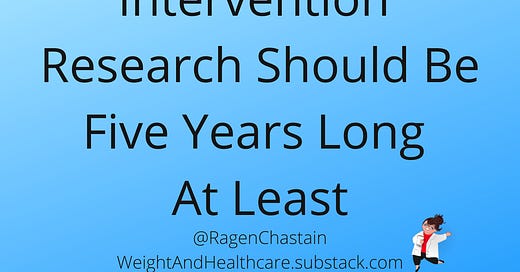Weight Loss Research Should Be Five Years Long - At Least
This is the Weight and Healthcare newsletter. If you like what you are reading, please consider subscribing and/or sharing using the button that looks like an arrow at the top and bottom of the piece!
We have about a century of information showing that the vast majority of people who attempt weight loss will lose some weight in the first year or so and then regain it within years two through five. When it comes to weight loss drugs, there is a long history of approving the drugs based on short-term research (during which there were often serious side effects), followed by a lack of long-term efficacy and, in some cases, having to pull the drugs from the market because of the harm that they have done.
Note that, in this post, I won’t be talking about weight loss surgery because it creates an often irreversible and life-long disease state in a once healthy digestive system, and so should have far more stringent requirements to be considered an ethical, evidence-based intervention. I wrote more about it here.
The weight loss industry (including within the healthcare system) has long been taking advantage of this situation. They create studies that are designed to show the weight loss portion of their intervention, but avoid or obscure showing the subsequent regain.
So it’s either a one-year (or less) study, or a two-year study wherein people gain back part of their weight in the second year, and then the tracking stops and the conclusion says something disingenuous like “all participants experienced weight regain, but remained below their starting weight” without pointing out that the trajectory of their weight was headed straight up before they stopped tracking it, and they had no reason to believe that it leveled off the day they stopped watching it, and every reason to believe it would continue to total regain or more. (They also typically fail to mention things like massive drop-out rates.)
Instead, the studies, with their extremely limited data and questionable conclusions, are made public (often accepted and published by a peer-reviewed journal,) and the interventions are foisted on unsuspecting fat* people as “clinically proven.” And when they, almost inevitably, fail, the fat people blame themselves and/or are blamed by everyone else (often including their healthcare providers.) Worse, not only has the intervention (predictably) failed them, but they will potentially be harmed by this exposure to weight cycling.
When it comes to diet drugs, the formula for research-creation is much the same, but the ante for harm is upped significantly due to possible side effects of the drug. Wegovy is an excellent example. It was approved based on a 68-week trial (during which weight loss had already leveled off and, in fact, started to tick up at the very end.) It had also shown serious, potentially life-threatening, side effects. We also know that when the trial ended and people stopped taking the drug, they regained the weight they had lost. No problem says Novo Nordisk (the manufacturer) because we think people should stay on the ($1,300US per month) drug for the rest of their life! (Hence the weight loss industry’s big push that simply existing in a higher-weight body be considered s a “chronic, lifelong health condition.”)
Potentially life-threatening side effects were discovered during a 1.3 year trial (to say nothing of the fact that this is a type two diabetes medication and we have no idea what the long-term effects of giving a large does of type two diabetes medication to people who don’t have type two diabetes are.) But we who are fat are supposed to sign up to take it for life? And if history repeats itself Novo Nordisk will not be in any hurry to produce more long-term results, simply riding their 68-week trial as long as they can. For more information on this I wrote specifically about Wegovy here, and about Novo Nordisk’s questionable marketing tactics here.
So we have a significant amount of information about the failure rates and harms of these interventions, dating back in some cases one hundred years. And instead of those with authority using that information to protect patients, it’s allowed to be manipulated by the weight loss industry to continue to roll out (or keep selling) interventions that are nearly sure to fail, pose significant harm, and often generate significant profit.
Enough.
If I could put a warning sticker on these short-term studies, it would say:
Warning: This study has inadequate follow-up. Should the results be similar to similar interventions in the past, the vast majority of participants will have regained all of the lost weight within two to five years.
So what can we do? Systemic change is needed here, and there are things that we, as patients and consumers, can do. I’ll discuss those in part 2.
Did you find this post helpful? You can subscribe for free to get future posts delivered direct to your inbox, or choose a paid subscription to support the newsletter and get special benefits! Click the Subscribe button for details:
Like this piece? Share this piece:
More Research
For a full bank of research, check out https://haeshealthsheets.com/resources/
*Note on language: I use “fat” as a neutral descriptor as used by the fat activist community, I use “ob*se” and “overw*ight” to acknowledge that these are terms that were created to medicalize and pathologize fat bodies, with roots in racism and specifically anti-Blackness. Please read Sabrina Strings: Fearing the Black Body – the Racial Origins of Fat Phobia and Da’Shaun Harrisons Belly of the Beast: The Politics of Anti-Fatness as Anti-Blackness for more on this.



